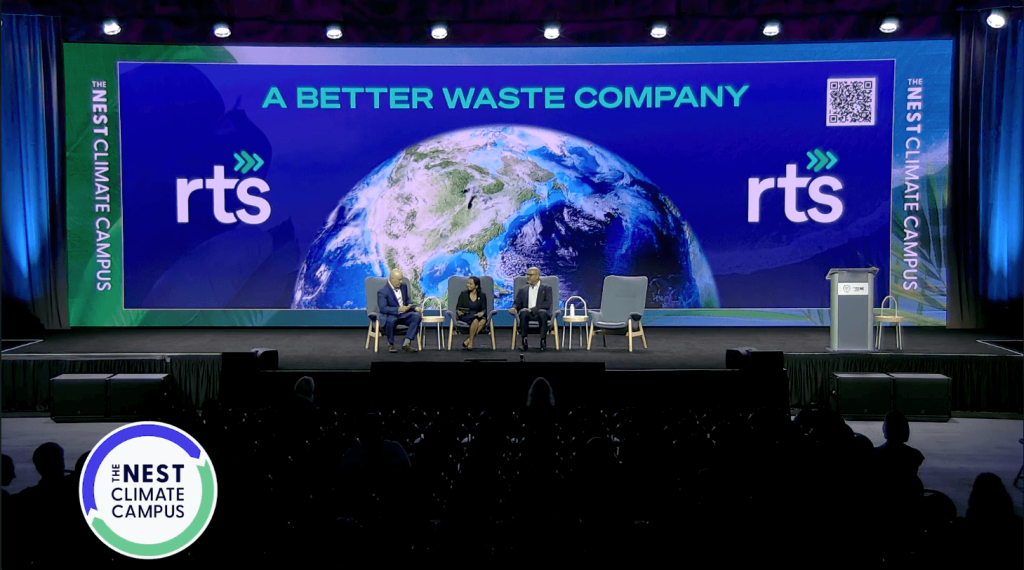This essential panel, hosted at the Nest Climate Campus during Climate Week 2025, provided a critical, behind-the-scenes look into managing waste and maximizing sustainability at major public venues. The discussion focused on how innovation and commitment are driving high waste diversion rates at two iconic New York institutions, the Javits Center and City Field (home of the New York Mets).
The Panelists: Operational Leaders in Sustainability
The session was introduced by the co-founder of RTS and featured sustainability directors responsible for managing combined annual traffic of over 5 million people:
Gregory Lettieri, CEO and Co-Founder, Recycle Track Systems (RTS) (Moderator)
Yashi Dadhich, Director of Energy and Sustainability, Javits Center
Michael Dohnert, Executive Director, Facility & Sustainability Strategies, New York Mets
The Challenge: Turning Waste from Aspiration into Action
Gregory Lettieri set the context by noting that waste volumes are projected to double by 2050, requiring AI-driven systems (like RTS’s Pello) and data to predict, prevent, and optimize waste management at scale. The Javits Center and City Field showcase what is possible when commitment and innovation meet this immense challenge.
1. Javits Center: Simplifying Streams to Achieve 95% Diversion
Yashi Dadhich explained that sustainability is part of the Javits Center’s DNA. Their success stems from tackling complex waste streams and simplifying recycling for attendees:
Tackling Contamination: The Javits Center simplified its front-of-house recycling stream to only bottles and cans and color-coded receptacles to overcome attendee confusion over “mixed recycling.”
Record Diversion: This operational rigor allows the center to maintain an impressive 45% waste diversion rate annually, and on the day of the panel, they achieved a single-day 95% diversion rate from their compactor—a staggering figure that confirms that material thrown in the recycling bins is being accounted for.
New Waste Streams: The center has successfully baled over 450 bales of cardboard and started collecting and recycling soft plastics, which are then brought back into society as decking materials, closing the recycling loop.
Future Focus: The next major challenge is tackling organics waste at the front of the house, which requires education and split-second decision-making from attendees.
2. New York Mets: Doubling Diversion and Educating Fans
Michael Dohnert shared the challenge of balancing high customer experience for millions of fans with reducing consumption and emissions.
Waste Diversion Success: City Field has increased its waste diversion rate from roughly 25% just five years ago to pushing 50% (significantly above the industry average of 25%). This is achieved by meticulously separating and cleaning waste streams like cardboard and back-of-house compost.
The Real Estate Trade-Off: The Mets have been unable to act on potential sustainability initiatives like solar panels, battery storage, and EV chargers because the real estate (parking lots) is tied up in long-term development plans like the proposed Metropolitan Park project. This demonstrates the hard choices and fluidity of sustainability initiatives.
Cultural Education: Dohnert stressed the personal motivation of leaving a better world for his son. He views every fan (over 3 million attendees in a record year) as an opportunity to influence the community by showing them “how easy recycling is” and stressing that their actions are part of a “much much larger reason.”
Session Conclusion: The Power of Measurement and Influence
The panel underscored the monumental scale of waste management at these facilities, with over 5 million combined annual attendees. The key takeaway is that sustainability requires constant vigilance and is inherently fluid.
The success of the Javits Center and the New York Mets rests on commitment, making hard, data-backed choices, and using their high-profile platforms to educate millions of people on the feasibility of high-level waste diversion.
Explore more transformative discussions from the Nest Climate Campus by checking out our full series of Climate Week 2025 sessions on ESG News.

